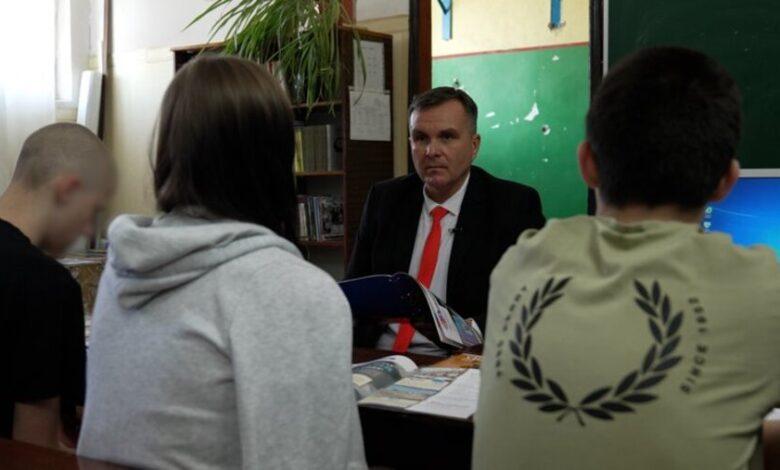Education behind bars: how minors study in the Chernihiv pre-trial detention center during wartime (video)

During the war, Ukrainian children study in shelters, evacuation centers, abroad, in temporary rooms without light and heat. But there are also those who master the school program in institutions that have nothing to do with education – in the cells of detention centers. There are currently five minors in the Chernihiv SIZO. They are suspected of committing serious crimes: theft, sabotage, murder. However, despite everything, they remain students who have the right to education.
The educational process for teenagers in pre-trial detention centers
The educational process for teenagers in pre-trial detention centers is provided for by Ukrainian legislation. The state does not deny the right to education even to those who are in custody pending a court verdict. Chernihiv Lyceum No. 15 took on this task in the Chernihiv detention center. Twenty of his teachers provide training of five teenage suspects. Lessons are held regularly, according to the schedule, in compliance with the curriculum. Teachers travel to the institution, sometimes combining it with remote formats.
The main form of training is pedagogical patronage, i.e. individual or small-group classes, maximally adapted to the conditions of stay in the pre-trial detention center. As Yuriy Bilokolosha, the acting head of the Chernihiv detention center, noted, the format was chosen based on the effectiveness of live communication: the student can ask questions, receive explanations and clarifications, which is much more difficult in a remote environment.
One of the teachers, Oleksiy Mykhaylov, teaches English to teenagers at the pre-trial detention center every Wednesday. He is a translator by profession, has experience working in the USA, and currently teaches at Lyceum No. 15. In 2024, he deliberately agreed to work in an isolation ward. According to him, it is morally difficult, especially at first, but it is fundamental to treat these teenagers as children, and not as criminals.
“Our task is to give them a chance. Not just to teach English, but to make it clear that they have an alternative. That they were not written off.” says Mihailov.
Each class takes about 40 minutes of travel time. There are three students of the tenth grade in the audience. Silence, a guard at the entrance, a supervisor nearby — and at the same time, an atmosphere in which pedagogical ethics should be preserved.
Classes are held four days a week, from Monday to Thursday, two or three classes a day. Online sessions on Friday. Teenagers complete tests, receive grades, pass annual evaluations – everything is the same as in a regular school. The academic year ends on May 30.
In each lesson, in addition to the teacher and the student, there is a representative of the institution – an employee of the social-educational and psychological work sector. Its function is behavior control, security, support. The teacher and student have some autonomy, but being supervised is a safety requirement that cannot be violated.
The story of a teenager who changed his attitude to studying in a cell
Vitaly, a 16-year-old teenager from Chernihiv Oblast, is one of Mykhaylov’s students. He is suspected of sabotage – an attempt to set fire to a relay box on a railway track. According to him, he agreed to the proposal of an acquaintance, not realizing the consequences.
“Then I didn’t understand who he was talking to and why. Now everything has become clear.” – says the boy.
Since October 2024, he has been in a pre-trial detention center. Here he completes the 10th grade. He admits that he has become better at studying:
“Before, I was not very interested in history, but now I started reading more. Lessons help to distract from all thoughts, to concentrate.”
There are two options for the future: admission to a military school or higher education. Once he dreamed of becoming a designer, now he is thinking about service or studying in a more realistic direction.
Photo: suspilne.media
Psychological and social dimension of education in pre-trial detention centers
Studying in a pre-trial detention center is not only formal education, but part of resocialization, that is, the return of juveniles to society with a chance to start from scratch. Education reduces the risk of reoffending, gives a sense of belonging to society, and creates an internal resource for change.
The conditions under which this process takes place are extremely complex: psychological pressure, isolation, waiting for trial, stigmatization. Teachers work not only as teachers, but also partly as mentors. Their role is to show that learning remains an open space even where there is no freedom.
In the Chernihiv SIZO today, there is a struggle not only for the law, but also for the future. For an opportunity for a minor suspect not to lose contact with himself, with the world, with hope. While the war is going on, educators are waging another war — for every student, for every soul who can still change the path. And while these children pass tests in the detention center, the country gives them a chance to learn to live differently.





